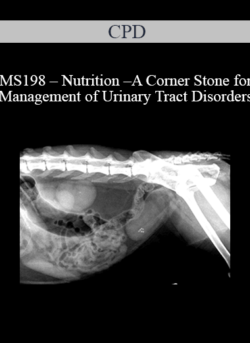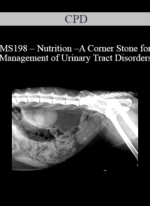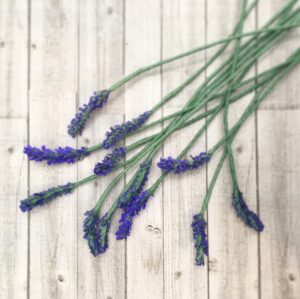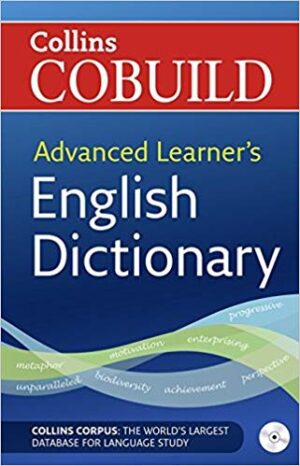[Pre-Order] – Deliver digital download link within 4-8 business days after successful payment. Please contact us to get more details. Purchase CPD – MS198 – Nutrition – A Corner Stone for Management of Urinary Tract Disorders courses at here with PRICE $479 $114MS198 – Nutrition – A Corner Stone for Management of Urinary Tract Disorders£347.00 (+VAT)12 months access to recordings and course materials is included. Please note that these are webinar recordings and not live events. Full details on how to access the Mini Series will be emailed to you.Join Marge Chandler DVM, MS, MANZCVS, DACVN, DACVIM, MRCVS for three 2-hour online sessionsComprehensive notes to downloadedSelf-assessment quizzes to ‘release’ your 8 hours CPD certification (don’t worry, you can take them more than once if you don’t quite hit the mark first time)A whole year’s access to recorded sessions for reviewing key pointsSuperb value for money – learn without travellingWatch the recordings on your iPad!This Mini Series was recorded in April 2019 ProgrammeSession 1Too much pee! Updates in nutritional management of chronic kidney diseaseWith new tests available, we are now able to diagnose chronic kidney disease (CKD) earlier and this means making nutritional decisions earlier. Feeding a diet formulated for renal disease increases survival time and improves quality of life, but when should we start and what should we feed? This lecture will discuss the key nutritional features of a renal diet and the evidence for their use. Dietary protein restriction is often a concern for practioners; the current evidence about protein in CKD will be presented. The key nutrient phosphorus will also be discussed along with other critical nutritional factors. Pets with CKD often have poor appetites and can be difficult to transition to a diet for renal disease and the ways to approach this will be discussed. The nutritional approach to the patient should be individualized based on that patient’s history, clinical status, IRIS stage, nutritional assessment, and the desires of the owner.What you’ll learn:When to consider dietary management for chronic kidney diseaseHow to encourage pets with chronic kidney disease to eatHow to transition a pet from a maintenance diet to a diet for renal diseaseThe nutritional attributes of a diet appropriate for management of kidney disease Session 2Can’t pee? Dietary management of urolithiasis – when and how can it help?Struvite stones in dogs are usually associated with a urinary infection and can be dissolved with appropriate dietary and therapeutic management, whereas struvite stones in cats are more likely to be present in sterile urine and can be dissolved and controlled with appropriate dietary management. Calcium oxalate stones be difficult to control; surgery is often necessary for removal, although dietary management can help decrease the risk of reoccurrence. The next most common of these stones in dogs are the urate or biurate stones found in Dalmatian dogs and dogs with portosystemic shunts or end stage liver disease. These are less commonly found in cats although can be found in association with liver disorders. Dietary management can help decrease the risk of recurrence of urate uroliths in dogs at risk.What you’ll learn:How to treat struvite urolithiasis with dietary and medical managementThe pathophysiology of calcium oxalate and urate urolithiasisHow to decrease the risk of calcium oxalate and urate urolithiasis recurrence Session 3The stressed peeing cat – how do we treat feline LUTD?Feline lower urinary tract disorder (FLUTD) is an important clinical problem in cats and has been rated a top feline health concern by cat owners. Feline LUTS involves a single sign or combination of dysuria, hematuria, pollakiuria, stranguria and periuria. The top two most common causes of FLUTD are feline idiopathic cystitis (FIC) and urolithiasis in cats younger than approximately 10 years of age, while in cats older than 10 years of age, bacterial urinary tract infections and urolithiasis are most common. For cats with FIC, decreasing stress, environmental enrichments, increased water intake (moist foods), and stress and anxiety modification with nutrients and dietary ingredients have been shown to decrease the frequency of signs.What you’ll learn:The prevalence of the aetiologies of feline lower urinary tract diseaseThe pathophysiology of feline interstitial cystitisEnvironmental and nutritional management of feline urolithiasisSalepage: https://cpd-solutions.com/store/product/ms198-nutrition-a-corner-stone-for-management-of-urinary-tract-disorders/Archive: https://archive.ph/wip/IuqLKPurchase CPD – MS198 – Nutrition – A Corner Stone for Management of Urinary Tract Disorders courses at here with PRICE $479 $114
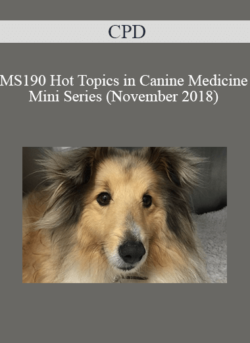 CPD – MS190 Hot Topics in Canine Medicine Mini Series (November 2018)
₹18,924.00
CPD – MS190 Hot Topics in Canine Medicine Mini Series (November 2018)
₹18,924.00
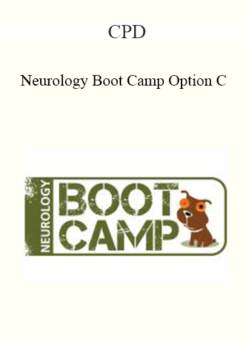 CPD – Neurology Boot Camp Option C
₹28,220.00
CPD – Neurology Boot Camp Option C
₹28,220.00
CPD – MS198 – Nutrition – A Corner Stone for Management of Urinary Tract Disorders
₹18,924.00

